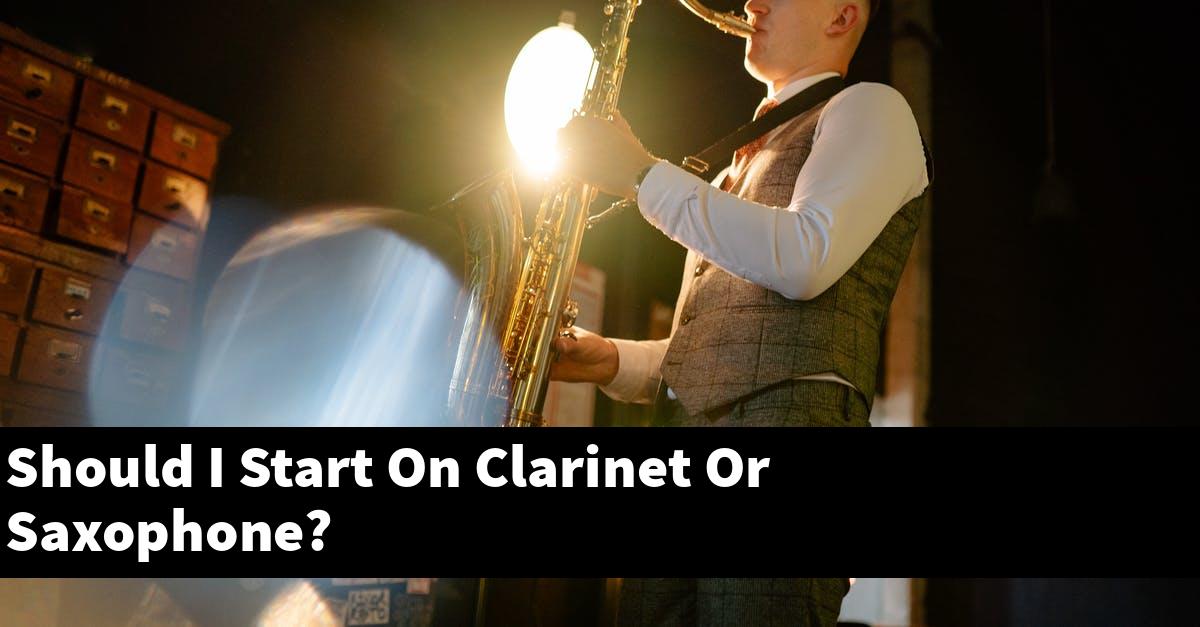If you are a fan of classical music, it might be a good idea to start on the clarinet. If you enjoy jazz and rock music, the saxophone might be a better option.
The decision of whether or not to start on a clarinet or saxophone can be difficult, but it is important to consider your playing goals and the instrument’s capabilities.
If you are looking to learn classical pieces or jazz, clarinet is a better choice because it has a more mellow sound. If you are looking to play rock or pop music, the saxophone is a better choice because it has a more brassy sound.
Are there particular styles of music that Clarinet is better suited for?
There is no definitive answer to this question as it depends on the individual musician’s preferences and style. However, some people may find that Clarinet is better suited for classical or traditional music styles, while others may prefer more contemporary or Rock music.
It is important to remember that Clarinet is an expressive instrument that can be used to create a wide variety of sounds, so it is up to the musician to find the style of music that is best suited for them.
What are some beginner clarinet lessons that would be good for me?
One of the best beginner clarinet lessons for someone just starting out is to learn how to play a simple melody. This can be done by practicing simple melodies over and over again, or by learning a few simple riffs and melodies.
Additionally, it is important to practice articulation, or the ability to produce clear and precise notes. Practice playing in time, and gradually work your way up to more complicated music. Finally, it is also important to practice regularly, so that you can develop a strong clarinet technique.
Which clarinet would be best for me to start with?
There is no one specific clarinet that is “the best” for everyone, as the choice of clarinet will largely depend on the individual player’s needs and preferences. However, if someone is just starting out and is unsure which clarinet to choose, a beginner-level clarinet, such as a B-flat clarinet, may be a good choice.
There are a variety of clarinet brands and models available on the market, so it is important to research which one is the best fit for the individual player. Some factors to consider when making this decision include the clarinet’s size (small, medium, or large), the make and model of the clarinet, the price range, and the player’s experience level.
Ultimately, the best clarinet for any individual player will depend on their own individual needs and preferences.
Is it easy to play saxophone if you play clarinet?
It is not easy to transition to playing saxophone if you are already playing clarinet. Clarinet is a lower-pitched instrument that saxophone is designed to play, so you will need to practice a lot to get the skills necessary to play the instrument.
Additionally, clarinet players typically use a lot of reeds which are not compatible with saxophone reeds, so you will also need to learn how to adjust your playing style to match the unique requirements of the saxophone.
How hard is it to switch from clarinet to saxophone?
There is no one-size-fits-all answer to this question, as the difficulty of switching from one instrument to another will vary depending on the skills and experience of the individual musician. However, in general, it can be said that it is relatively easy to switch from clarinet to saxophone, provided that the musician has the necessary skills and experience.
The main difference between the two instruments is that saxophone players traditionally use their voices more than clarinet players. This means that saxophone players must have a greater understanding of their instrument’s capabilities and be able to produce a wide variety of sounds.
Clarinet players, on the other hand, are generally better at producing single notes and melodies.
Additionally, saxophone players must be able to use their embouchure – the way they produce sound – in a more flexible way than clarinet players. This is because saxophone players need to be able to produce a variety of tones, from low to high notes, which requires them to be able to produce tones at different pitches.
Overall, it is relatively easy to switch from clarinet to saxophone, provided that the musician has the necessary skills and experience.
Is playing the saxophone similar to clarinet?
There are many similarities between playing the saxophone and playing the clarinet, but there are also some key differences.
The main difference is that a saxophone has a much larger range than a clarinet, and can be used to play a wider variety of sounds.
A saxophone can also be played in a much higher register than a clarinet, which gives it a more distinctive sound.
Additionally, a saxophone typically has a wider mouthpiece than a clarinet, which makes it easier to produce higher-pitched sounds.
Conclusion
There is no definitive answer to this question since it depends on your specific interests and preferences. However, if you are a fan of classical music, it might be a good idea to start on the clarinet. If you enjoy jazz and rock music, the saxophone might be a better option.


